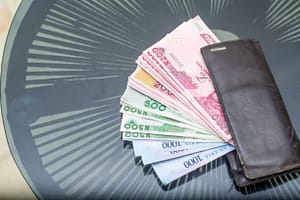
 On Monday, the Nigerian naira hit a record low, dropping to N1,534.39 against the dollar at the Nigerian Autonomous Foreign Exchange Market (NAFEM), the nation’s official exchange platform. Concurrently, the currency’s value declined to N1,490 per dollar in the parallel market, with expectations of further devaluation due to escalating dollar shortages.
On Monday, the Nigerian naira hit a record low, dropping to N1,534.39 against the dollar at the Nigerian Autonomous Foreign Exchange Market (NAFEM), the nation’s official exchange platform. Concurrently, the currency’s value declined to N1,490 per dollar in the parallel market, with expectations of further devaluation due to escalating dollar shortages.
This marked the second occurrence in recent months where the official exchange rate was weaker than that of the parallel market.
Previously, on January 30, the naira was valued at N1,482.57 to the dollar at NAFEM, and N1,460 per dollar in the parallel market, again influenced by the ongoing scarcity of dollars.
The scarcity has led to a continuous depreciation of the naira in both markets, significantly impacting importers who struggle to obtain the required dollars through official and unofficial channels.
A street trader highlighted to Business Day, “Dollars are scarce in the market. There’s a high demand but a low supply, driving the prices up.”
Richard Obire, a former Executive Director at Keystone Bank Limited, suggested reversing Nigeria’s trend of heavy reliance on imported goods and services to bolster the naira. He pointed out that corruption-driven capital outflows and a failure to produce at a scale that engages Nigeria’s large population are detrimental to the country’s economy.
To strengthen the naira, Obire recommended increasing the supply of hard currencies without harming the market and decreasing demand for them. He also emphasized the urgency of addressing security issues that affect food production.
Obire proposed, “We need to ramp up domestic food production and cut down on our food import bill. All government spending that requires hard currency should be halted immediately.”
In a related development, the International Monetary Fund (IMF) has called on the Nigerian government to completely remove subsidies for fuel and electricity, criticizing them as costly and inefficient. The IMF suggests that removing these subsidies would likely lead to higher fuel and electricity prices, aligning them more closely with actual market values.
The IMF recognized the Tinubu administration’s reforms, such as fuel subsidy removal and exchange rate unification, and urged for continued efforts in revenue mobilization and digitalization to enhance public service delivery and fiscal sustainability.
The institution also recommended temporary, targeted support to help the most vulnerable populations cope with the cost-of-living crisis, stressing that fuel and electricity subsidies are expensive, inefficient, and should be entirely phased out.


[…] Read Also:Naira hits record low of 1534 per dollar at official market. IMF tells President to increase electri… […]